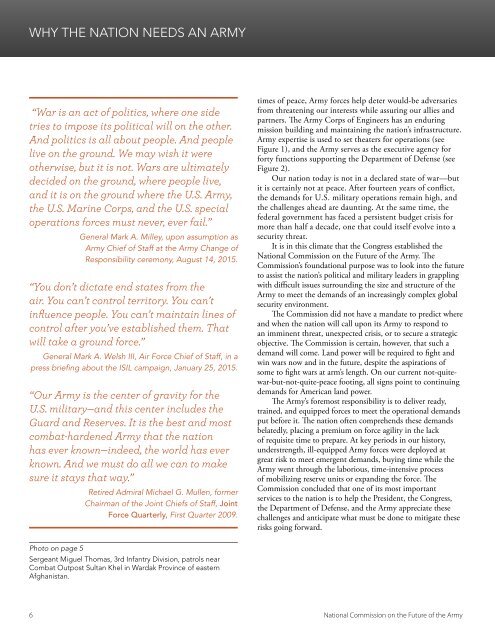THE FUTURE OF THE ARMY
1PlAz6L
1PlAz6L
You also want an ePaper? Increase the reach of your titles
YUMPU automatically turns print PDFs into web optimized ePapers that Google loves.
WHY <strong>THE</strong> NATION NEEDS AN <strong>ARMY</strong><br />
“War is an act of politics, where one side<br />
tries to impose its political will on the other.<br />
And politics is all about people. And people<br />
live on the ground. We may wish it were<br />
otherwise, but it is not. Wars are ultimately<br />
decided on the ground, where people live,<br />
and it is on the ground where the U.S. Army,<br />
the U.S. Marine Corps, and the U.S. special<br />
operations forces must never, ever fail.”<br />
General Mark A. Milley, upon assumption as<br />
Army Chief of Staff at the Army Change of<br />
Responsibility ceremony, August 14, 2015.<br />
“You don’t dictate end states from the<br />
air. You can’t control territory. You can’t<br />
influence people. You can’t maintain lines of<br />
control after you’ve established them. That<br />
will take a ground force.”<br />
General Mark A. Welsh III, Air Force Chief of Staff, in a<br />
press briefing about the ISIL campaign, January 25, 2015.<br />
“Our Army is the center of gravity for the<br />
U.S. military—and this center includes the<br />
Guard and Reserves. It is the best and most<br />
combat-hardened Army that the nation<br />
has ever known—indeed, the world has ever<br />
known. And we must do all we can to make<br />
sure it stays that way.”<br />
Retired Admiral Michael G. Mullen, former<br />
Chairman of the Joint Chiefs of Staff, Joint<br />
Force Quarterly, First Quarter 2009.<br />
times of peace, Army forces help deter would-be adversaries<br />
from threatening our interests while assuring our allies and<br />
partners. The Army Corps of Engineers has an enduring<br />
mission building and maintaining the nation’s infrastructure.<br />
Army expertise is used to set theaters for operations (see<br />
Figure 1), and the Army serves as the executive agency for<br />
forty functions supporting the Department of Defense (see<br />
Figure 2).<br />
Our nation today is not in a declared state of war—but<br />
it is certainly not at peace. After fourteen years of conflict,<br />
the demands for U.S. military operations remain high, and<br />
the challenges ahead are daunting. At the same time, the<br />
federal government has faced a persistent budget crisis for<br />
more than half a decade, one that could itself evolve into a<br />
security threat.<br />
It is in this climate that the Congress established the<br />
National Commission on the Future of the Army. The<br />
Commission’s foundational purpose was to look into the future<br />
to assist the nation’s political and military leaders in grappling<br />
with difficult issues surrounding the size and structure of the<br />
Army to meet the demands of an increasingly complex global<br />
security environment.<br />
The Commission did not have a mandate to predict where<br />
and when the nation will call upon its Army to respond to<br />
an imminent threat, unexpected crisis, or to secure a strategic<br />
objective. The Commission is certain, however, that such a<br />
demand will come. Land power will be required to fight and<br />
win wars now and in the future, despite the aspirations of<br />
some to fight wars at arm’s length. On our current not-quitewar-but-not-quite-peace<br />
footing, all signs point to continuing<br />
demands for American land power.<br />
The Army’s foremost responsibility is to deliver ready,<br />
trained, and equipped forces to meet the operational demands<br />
put before it. The nation often comprehends these demands<br />
belatedly, placing a premium on force agility in the lack<br />
of requisite time to prepare. At key periods in our history,<br />
understrength, ill-equipped Army forces were deployed at<br />
great risk to meet emergent demands, buying time while the<br />
Army went through the laborious, time-intensive process<br />
of mobilizing reserve units or expanding the force. The<br />
Commission concluded that one of its most important<br />
services to the nation is to help the President, the Congress,<br />
the Department of Defense, and the Army appreciate these<br />
challenges and anticipate what must be done to mitigate these<br />
risks going forward.<br />
Photo on page 5<br />
Sergeant Miguel Thomas, 3rd Infantry Division, patrols near<br />
Combat Outpost Sultan Khel in Wardak Province of eastern<br />
Afghanistan.<br />
6 National Commission on the Future of the Army


